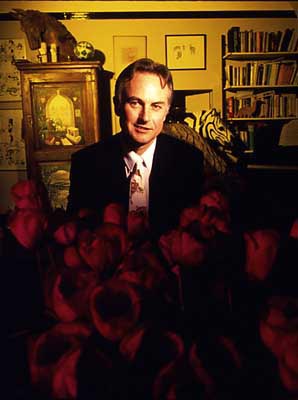Texte
Science,
Delusion and the Appetite for Wonder
Richard Dawkins
Richard Dimbleby Lecture, BBC1 Television, November 12th, 1996
You could give
Aristotle a tutorial. Aristotle was an encyclopedic polymath,
an all time intellect. Yet not only can you know more than him
about the world. You also can have a deeper understanding of
how everything works. Such is the privilege of living after
Newton, Darwin, Einstein, Planck, Watson, Crick and their
colleagues.
I'm not saying
you're more intelligent than Aristotle, or wiser. For
all I know, Aristotle's the cleverest person who ever lived.
That's not the point. The point is only that science is
cumulative, and we live later.
Here's a small
sample of the things you could tell Aristotle, or any other
Greek philosopher:
- The earth is
not the center of the universe. It orbits the sun -- which
is just another star.
- Living
species are not isolated types with unchanging essences.
Instead, over a time scale too long for humans to imagine,
they split and diverge into new species, which then go on
diverging further and further.
- The brain is
not for cooling the blood. It's what you use to do your
logic and your metaphysics.
What about our
descendants, what will they be able to tell us? So does this
mean that our view of the universe will turn out to be just as
wrong? Yes, there's much that we still don't know. But surely
our belief that the earth is round and not flat, and that it
orbits the sun, will never be superseded. That alone is enough
to confound those, endowed with a little philosophical
learning, who deny the very possibility of objective truth:
those so-called relativists who see no reason to prefer
scientific views over aboriginal myths about the world.
Our belief that
we share ancestors with chimpanzees, and more distant
ancestors with monkeys, will never be superseded although
details of timing may change. Many of our ideas, on the other
hand, are still best seen as theories or models whose
predictions, so far, have survived the test.
Far from
science not being useful, my worry is that it is so useful as
to overshadow and distract from its inspirational and cultural
value. There
is an appetite for wonder, and isn't true science well
qualified to feed it? It's
often said that people 'need' something more in their lives
than just the material world. There is a gap that must be
filled. People need to feel a sense of purpose. Well, not a
BAD purpose would be to find out what is already here, in the
material world, before concluding that you need something more.
How much more do you want? Just study what is, and you'll find
that it already is far more uplifting than anything you could
imagine needing.
http://www.edge.org/3rd_culture/dawkins/lecture_p1.html
"In
einer Darwin-Welt möchte ich nicht leben"
DER STANDARD, 11. Mai 2000
Richard Dawkins, Evolutionsbiologe in Oxford, der Darwin
weitergetrieben hat - bei ihm sind die Gene selbst die
,Akteure' -, sprach darüber und über Religion und Mozart mit
Jürgen Langenbach.
http://derstandard.at/dyn/archiv/archarchiv.asp?artfn=/archiv/20000511/100.htm&strTitle=%22In+einer+Darwin%2DWelt+m%F6chte+ich+nicht+leben%22
|




